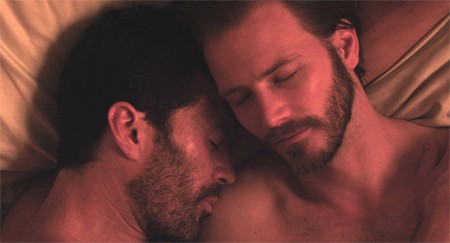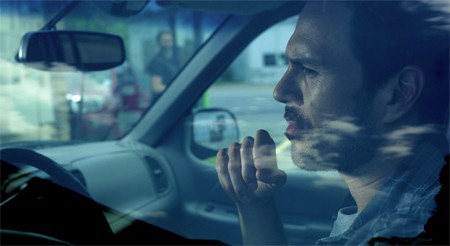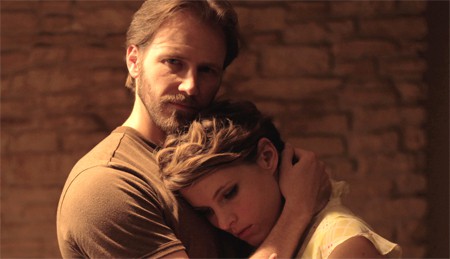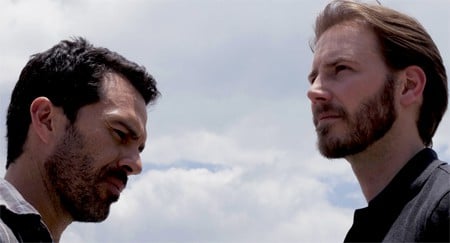
Marcus DeAnda and Bill Heck star in the new gay drama "Pit Stop"
With Outfest and other LGBT film festivals right around the corner I thought I'd point your eyes at PIT STOP, a fine new romantic drama from writer/director Yen Tan (Ciao). I've just returned from serving on the narrative jury of the Nashville International Film Festival and we handed this "vitally resonant LGBT romance" the screenplay prize for its complicated road map of broken hearts and missed connections. Though the film follows a handful of everyday people in a small Texas town, the key and parallel figures at its heart are Ernesto (Marcus DeAnda) and Gabe (Bill Heck), two gay men who are both grieving failed relationships while still practically living with their exes.
The film is quite moving with an enormously satisfying payoff so I sat down with writer/director Yen Tan, a Malaysian filmmaker who lives in Austin to talk about his process and the road map to getting Pit Stop made.
TOWLEROAD: Pit Stop is not a "coming out" story, the most typical type of gay movie, and it revolves around the lives of rural gay men. So right away it seems to be occupying a rare niche right now in terms of queer cinema. How did you and David Lowery develop this?
 YEN TAN: The idea came about when I was making road trips in Texas to work on an earlier film, and while making pit stops at the gas stations in the small towns between the cities, I wondered if there were gays who lived there, and what kind of lives they had. I looked into this by entering the chat rooms of gay.com back it its heyday. Over time, I found a handful who would tell me their stories. They had a lot of common traits: being married or having being married before was a big one, and so was the way they danced around the lines of visibility and invisibility. I thought it was very fascinating, being someone who is gay in the city, where I've almost forgotten what it was like to be in the closet in a really significant way.
YEN TAN: The idea came about when I was making road trips in Texas to work on an earlier film, and while making pit stops at the gas stations in the small towns between the cities, I wondered if there were gays who lived there, and what kind of lives they had. I looked into this by entering the chat rooms of gay.com back it its heyday. Over time, I found a handful who would tell me their stories. They had a lot of common traits: being married or having being married before was a big one, and so was the way they danced around the lines of visibility and invisibility. I thought it was very fascinating, being someone who is gay in the city, where I've almost forgotten what it was like to be in the closet in a really significant way.
I tried to assemble a story that would resonate with me personally, while avoiding certain pitfalls of the genre. When I'd done all I could with the script, I needed David to make everything sound more organic since it was crucial that Pit Stop feel authentic. I was born and raised in Malaysia, and English is my second language. David polished the dialogue quite a bit, and in the process, we also came up with some new scenes and subplots.
MORE AFTER THE JUMP...
Did you ever feel like stepping in and give advice or shake your head at the characters thought process? Or are you, as a writer/director, trying to remove yourself and merely observe?
I was maintaining my facade as a "journalist" the entire time, albeit I was very empathetic of their plights. Some of their issues could be resolved if they moved to a bigger city, but what I found both refreshing and frustrating was that the guys I spoke with didn't really want to move. They genuinely seemed to like living in a small town.
There was one guy I remembered who was in a rougher spot: he'd inherited a ranch from his dad, and he was in a more rural and homophobic community. He didn't want to move to the big city because he's always felt out of place there and wouldn't know what kind of job to look for, but he's also stuck in this town where there are no prospects for love or having the life he wants. The line that Gabe said in the film: "I always felt like I'm not, you know…hip." was something this guy said to me one time. That really made me understand where he was coming from.
Did any other real life lines work their way in?
"I'd kiss you again if we weren't standing here" was another line from real life. A one-nighter said that to me when I was in college. We were in a parking lot on campus. I thought it was one of the most romantic things I'd ever heard.
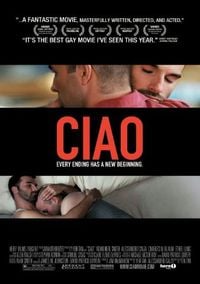 Love that scene! Your movie is a slow burn but it really accumulates power. I kept thinking "what is this reminding me of?" and it wasn't until the very end that I thought "CIAO !!!" I didn't even connect that you'd made both until afterwards.
Love that scene! Your movie is a slow burn but it really accumulates power. I kept thinking "what is this reminding me of?" and it wasn't until the very end that I thought "CIAO !!!" I didn't even connect that you'd made both until afterwards.
Ha, yes. That was my previous film. Pit Stop was actually written right before Ciao, so they could be cinematic siblings, or maybe that's just the way I choose to tell these stories. B. Ruby Rich wrote in her review on Film Quarterly that the film "makes demands on the audience that films ought to make – and pays them back with a surprising happy ending." Although I'm absolutely aware that a lot of audience these days aren't this patient. One of the best compliments I received for Pit Stop is that when it ends, they wouldn't mind watching another 20 minutes of it.
In both films I think the ending is the best scene, genuinely moving and sexy. I want to ask about working with your leads Marcus DeAnda and Bill Heck (who made a fine "Joe Pitt" Off Broadway in Angels in America recently). Was it tough to cast this?
Our casting director Katie Richter was great about casting a wide net, so we ended up getting auditions from all over. Although we did encounter a few instances of "gay panic"…
Gay Panic. I want names!
Some actors would send us a really great tape and then they'd bail at the callbacks after they read the entire script. That was frustrating.
Marcus was someone we found pretty early on, and he actually flew in from LA to Austin for his callback. Partly because he really wanted the role, and the other reason was that he wanted to make sure I could see with my own eyes that he is, in his words, "a tall Mexican." Apparently, he's had numerous experiences where directors would balk at his height. Bill Heck actually came about after we cast Amy Seimetz (who plays his ex-wife), as they were both with William Morris Endeavor and Amy put a really good word out for us. Gabe was the most challenging part to cast. Our shortlisted actors, including Bill, were all really, really good but in different ways. Ultimately, Bill felt the most right. He managed to convey a lot of the nuances of the character, stuff that was not necessarily on the page. That's a quality I really admire about him.
Sex scenes that feel real and crucial to the storytelling are a rarity in movies. I don't know how to ask this, um, delicately but, even though the big sex scene here is not explicit in the traditional sense, it sure reads "real". How did you handle this with the actors…
I gave myself this artistic burden that if I was going to feature a sex scene in the film, I'd have to earn it. Which also means it should feel the same way to the audience. They'd watch it and think: well, that was entirely necessary. I was also interested in presenting sex in a more spiritual context, because just being explicit in a physical sense is almost too easy to achieve, and so easy to find elsewhere. Explicit in an emotional way is another thing, and that's a lot more challenging to figure out.
I was very nervous about shooting the love scene in Pit Stop, but it turned out to be quite effortless. I talked to Bill and Marcus about what I was seeking to achieve emotionally, but I wasn't specific about the blocking. It's one short paragraph in the script but it's almost four minutes long in the film. And they were both very open. No hang-ups, no awkwardness. I remember we shot the first take and my cinematographer Hutch and I were watching the monitor and our mouths just dropped. I gave some minor directions and we proceeded to roll six more takes. There were three really amazing takes out of the seven, and we ended up picking the one that was the best, from a cinematography standpoint.
What do you make of the movement towards more explicit sex in legitimate cinema, both gay and straight like, oh, Nine Songs, Shortbus, I Want Your Love, Weekend, Lars von Trier's upcoming Nymphomaniac?
I personally think it's great. Sex is the most normal thing in the world. All of us have sex, but not all of us will commit an act of violence. Yet, the latter is so acceptable. I can guarantee you that all the actors who had "gay panic" in my auditions would have no problem with the script if they didn't have to make out with a dude but they would blast him in the face with a shotgun. There's something really fucked up about that notion. My theory about why cinema is raising its stakes in its portrayal of sex is that I think most of us are more accustomed to seeing it. Easily accessible internet porn has a lot to do with that. That does affect our expectations, subconsciously. Not to say that we expect films to be pornographic, but we do expect sex scenes in films to be more "real."
Congratulations, by the way, on your recent prizes at both the Nashville and Dallas Film Festivals.
We were really surprised, thank you!
So, what's the future of Pit Stop at this point?
We still have several festivals lined up. The Sundance premiere was tremendously helpful in putting the film on programmers' radar. The LGBT fest run is just about to start, so I'm very intrigued by how it'll be received there. We're currently negotiating a distribution deal, so hopefully, it'll be released by the end of the year.
Did Ciao (2008) open doors for you?
To an extent, probably more so in the festival world. It did not make it easier for me to get Pit Stop off the ground, if that's what you're asking.
What about critical and audience response – how has that been for you?
Ciao had a much rougher time critically. A lot of people absolutely hated that film. On the other hand, the fans of Ciao are very resilient. I still get fan mails to this day, and the film came out five years ago. I'm hoping Pit Stop will reach a wider audience, because it has more of a crossover potential. But we'll see. It's tougher these days for smaller films.
Would you ever make a Malaysian film?
Yes! Although I'm aware that whatever I make there will be banned or shut down by the government in two seconds. Who knows. Maybe there's a way.
What should we expect next from you after Pit Stop makes the rounds?
I'm currently looking at a bunch of projects, and also opening myself up to directing scripts written by others. They're all in the "dating" phase; I need to decide which one I'm committing to for the next few years.
Choose wisely and Pit Stop will be more of a Launching Pad.
KEEP AN EYE OUT FOR UPCOMING SCREENINGS OF "PIT STOP"
Nathaniel Rogers would live in the movie theater but for the poor internet reception. He blogs daily at the Film Experience. Follow him on Twitter @nathanielr.
